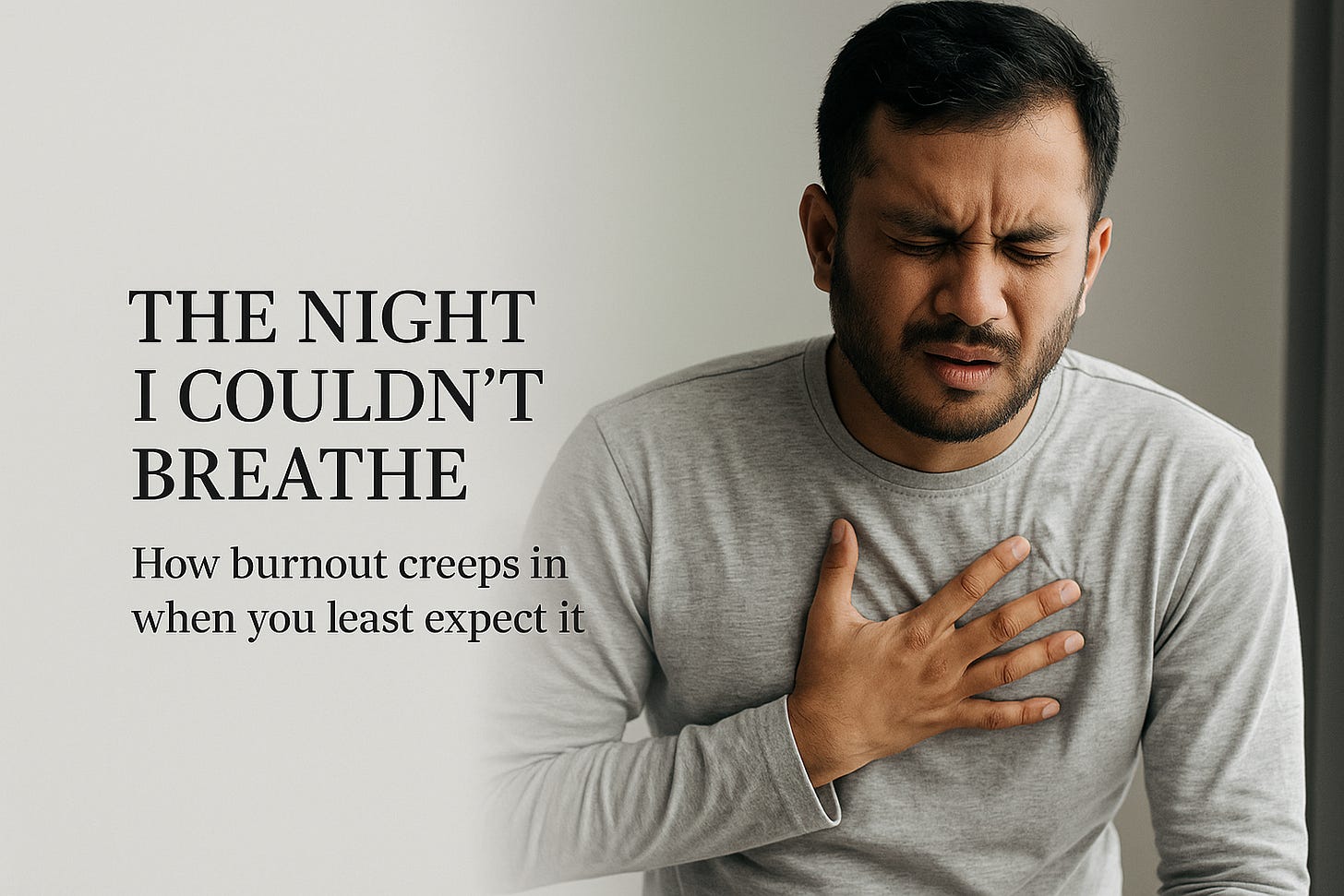"The Night I Couldn't Breathe"
How burnout creeps in when you least expect it
It was a regular evening in 2016. I was conducting a live online session — something I had looked forward to all week. This was during the early days of Facebook Live, and we had close to 100 people tuned in. I was energised, excited, and ready to give it my all.
But 30 minutes into the session, something strange happened.
I suddenly couldn’t breathe.
My hands began to feel numb. My face started cramping up. My heart was racing. And for a brief moment, I was convinced I was having a heart attack.
Panicked, I apologised to the live audience and said I needed to excuse myself. I shut my laptop and rushed to my room, telling my wife I couldn’t breathe. It only got worse — my fingers curled inwards, my breathing became shallow, and I grew frustrated and scared. I remember shouting, “I am trying to breathe, but I can’t!”
At that point, I honestly thought it could be a stroke. My mind started spiralling through the worst-case scenarios.
About fifteen minutes later, everything gradually subsided. I collapsed into sleep — physically drained, mentally shaken.
The next day, my wife insisted I see a doctor. So I did. I went through a full check-up — blood tests, urine tests, ECG, cholesterol levels, the works. I was bracing myself for bad news.
But the doctor looked at me and said, “Everything’s normal.”
I blinked. “Everything?”
“Yes,” he replied. “You’re healthy. Nothing’s wrong physically.”
And instead of feeling relieved, I felt… offended?
I had gone through something terrifying. I wanted an explanation. I asked the doctor again, “Are you sure?” And then came the sentence that cracked something open in me:
“It was likely a case of hyperventilation. Have you been stressed lately?”
I laughed. “No,” I said. “I know stress. I’ve been an entrepreneur working 7 days a week since 2009 — pitching to investors, paying salaries, navigating hiring challenges, recovering from six-figure losses, even being defrauded by a business partner. But I’ve not been stressed lately.”
And then he gently asked,
“Could it be that you’ve been suppressing stress? Not addressing things? Not talking about your problems? Not seeking help?”
That moment changed me.
Because the truth is, I had normalised the chaos. I kept going — with deadlines, responsibilities, expectations — without checking in with myself. I wasn’t resting. I wasn’t pausing. I wasn’t healing.
I had no idea that burnout can sneak up on you like that — not as a crash, but as a quiet build-up, masked by productivity and passion.
That experience became the seed for my book, Burnout, and now — this newsletter.
If you’re someone who’s constantly working, giving your all to your family, your career, your community — I want this space to be a weekly reminder for you:
That rest is not a luxury — it’s a necessity.
That your emotional and spiritual well-being matters.
That you are allowed to pause.
And that healing begins when we stop pretending everything’s fine.
To the Weary Heart is for people like you — the ones who are quietly holding a lot together.
I’ll be sharing stories, reflections, and gentle reminders every Monday. I hope you’ll find something here that helps lighten the load on your chest — even just a little.
And if you do, I’d be grateful if you shared it with a friend or colleague who might need it too.
You’re not alone.
Welcome. I’m glad you’re here.
One breath at a time,
Mizi Wahid



